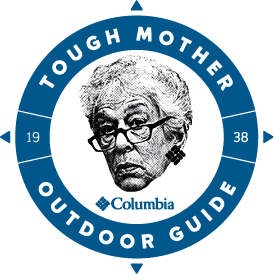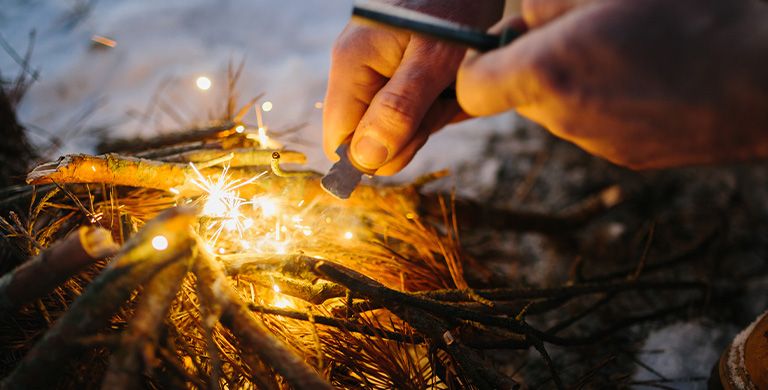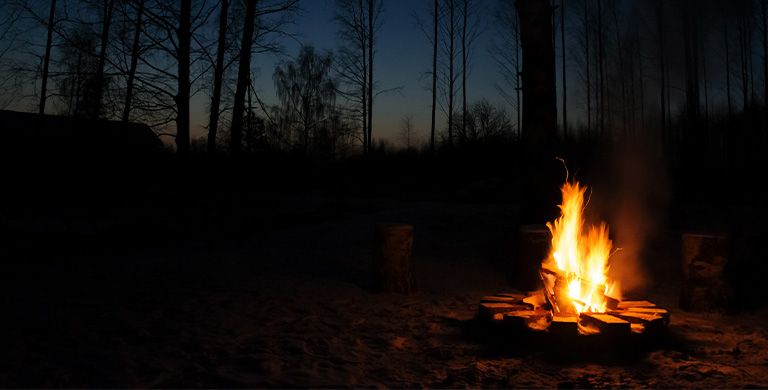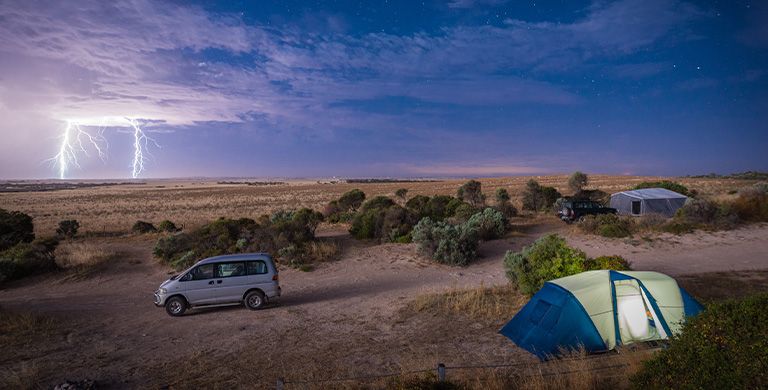CAMPING
How to Get That Smoke Smell Out of Clothes
Pro tips and tricks to getting that smokey campfire smell out of your camping clothes and shoes.
BY NANCY BOUCHARD
Since the advent of fire, people have depended on campfires to enhance outdoor activities. Cultures and religions have used fire pits for everything from ceremonies and cooking, to keeping warm, and of course, a forum for stories and music. Campfires can be used as emergency signals, or to bring people together over something as simple as toasting marshmallows. However, anyone who has logged significant campfire time can attest, the smell of smoke can cling to your hair, clothes and shoes.
We spoke with our expert adventurers who have camped in literally hundreds of national parks, state parks, and backcountry sites. Collectively, they’ve sat around thousands of campfires. To help you get ready for the camping season, here’s some tips for getting the smell of smoke out of your clothes.
We spoke with our expert adventurers who have camped in literally hundreds of national parks, state parks, and backcountry sites. Collectively, they’ve sat around thousands of campfires. To help you get ready for the camping season, here’s some tips for getting the smell of smoke out of your clothes.

At Camp:
1. Wash your hands. Better yet, take a shower or go for a swim. Most of the time, there’s more of a smoke smell on your hair and body than actual clothes. Clean up before sliding into your sleeping bag. Take a camp shower and scrub down with a scented body wash or soap. Use biodegradable soap. If you don’t have water, try a dry shampoo. It works on beards and mustaches too.
2. If you are camping, hang your clothes outside the tent, RV or van at night. Sunshine and fresh air do wonders when it comes to clearing that smokey scent from apparel. Sleep in a fresh set of nightclothes or naked (so you don’t bring the smoke into the tent) and leave your daytime apparel outside. If you’re worried about your clothes blowing away, pack a few wooden clothespins. You can hang your clothes on your tent pole, branch or string a lightweight clothesline (pro tip: dental floss works great for a clothesline).
3. There’s a tiktok/influencer buzz that recommends spritzing your smokey clothes with vodka to get the smell out. “Not a good idea,” says Drew Peterson, expert firefighter/Incident Commander for the US Forest Service. While alcohol (especially rubbing alcohol) is an excellent disinfectant, it is also highly flammable, so you don’t want to be spraying it on clothes that you’re wearing around a campfire. Or driving home smelling like booze, because, yes, vodka has a scent. Save the vodka for your martini, and let the air and sun do the heavy lifting.
4. Consider embracing the scent of the outdoors, camp smoke and all. Drew Peterson, who has worked dozens of wildfires, notes that “smoke covers all the other unwanted smells around the campfire exceedingly well.” “Time in the open air dissipates the smell, and washing is the most effective way, but for me, if I come home from work smelling like smoke, I’m greeted with a hero’s welcome. If I come home smelling like fresh laundry, I’m overlooked.” Natalie Chitwood, Columbia’s Graphic Production manager and former volunteer firefighter says, “We left the smell of smoke on as a badge of honor.” Don’t forget, there is a multi-million-dollar business in making candles and other scents that smell like campfires. Try to think about the smell as a temporary souvenir of your time outdoors

At Home:
1. Air your clothes out on your porch before you bring them inside the house. It’s always advisable to dump your pack or duffle outside anyway, as that gives bugs and other creepy crawlers time to escape.
2. Always check the laundry label on your outdoor apparel. That way you’ll know if something requires hand washing or if you can toss it into a machine. If a garment is hand-wash only, make sure you have a sink or tub that’s big enough. For delicate fabric, dry cleaning also gets out the smokey smell.
3. Don’t rush to wash. First, check your apparel for stains before you wash them. Pretreat the stains by soaking. If you find holes in your apparel caused by sparks or ash, use an iron-on patch, or a waterproof sealant (like Seam Grip) to repair the piece before washing.
4. Generally, wash technical apparel with cold or warm water, on a delicate or gentle cycle. If you’re really concerned about getting the smell of smoke out, put the washer on the steam setting. Use a scented detergent and dryer sheet. If you don’t have a big washing machine, consider taking your camping apparel to the laundromat. A commercial washer generally offers more volume than home machines, so you can wash more clothes at once.
5. Make sure to close zippers and attach snaps and hook and loop closures. If you are washing an item with Velcro, take care to not include anything else in the wash that might snag.
6. If you are washing wool or cotton camping apparel, remember that hang drying is often the best. Otherwise, use low to medium heat.
7. You can use a mild detergent with baking powder, which is an age-old deodorizer. Set the washer for an additional rinse cycle if you want to make sure you’ve removed any hint of odor (and residue).
8. Patrick Marshall, Research Engineer Columbia’s Innovation Department says that one thing to remember is that natural fibers like cotton and wool will absorb smoke but also shed it more easily than synthetics. “Cotton and wool release smoke molecules when you lightly wash them using a mild detergent,” explains Marshall. “This is due to their open, porous structure. Synthetic materials (this includes the synthetic fibers in shoes) can be a pain to remove odor molecules from (for example body odor and polyester). Their chemical structure makes synthetic fibers more attractive to the odor molecules. Wash with your normal detergent (and consider adding some baking soda). Then hang drying to increase the air flow will do the trick.”
9. To remove campfire smoke from boots and shoes, consider using am odor absorbing spray like Febreze. These sprays work in a similar way as soap and interact with the odor molecules and trap them. If your footwear needs more intensive cleaning, don't toss your hiking boots/shoes into the wash machine. Instead, you can scrub them with a stiff brush and mixture of baking soda and water. Strip out the insoles and give those a quick scrub as well (or replace them if they are worn out). Always air dry your shoes; and make sure the insoles are completely dry before you put them back in.
10. If you are washing technical fabrics, consider using a laundry soap that’s designed for the job. You can buy a technical wash for waterproof shells (we like Nikwax and Grangers), a baselayer wash that’s designed for wool, cotton, bamboo and synthetics, or one that’s specifically designed for down products. If you are washing a rainshell, this might be a good time to revitalize the DWR with a spray-on repellant.
11. There are plenty of social media recommendations about using lemon juice or vinegar in your wash machine to get stains out of clothes. Don’t do it! Consumer Reports (the gold standard for product reviews) has done extensive controlled studies; vinegar can melt the rubber seals and hoses in washing machines, especially those that are front loading. Additionally, introducing organic matter into your washing machine is simply a bad idea.
12. As both lemon juice and vinegar are mildly acidic, they can be used as stain removers for handwashing (they add a charge to the stain’s molecules, which in turn, attracts them to the charges in water molecules and helps loosen the stain from the fabric). But both can cause stains themselves. Lemon juice should only be used on white cotton (never synthetics or wool, and definitely not on apparel with colors) as it acts as a mild bleach.

The bottom line: you really don’t need to go to any extreme measures to get campfire smoke out of clothes. Granted, some people are extremely sensitive to the smell of smoke, but generally, some fresh air, sunlight, and a good wash cycle is all it takes.
For your next camping adventure, shop Columbia's wide range of outdoor apparel.



